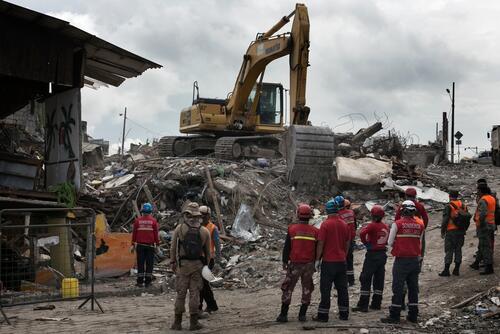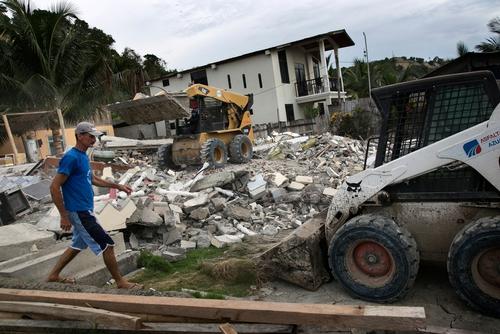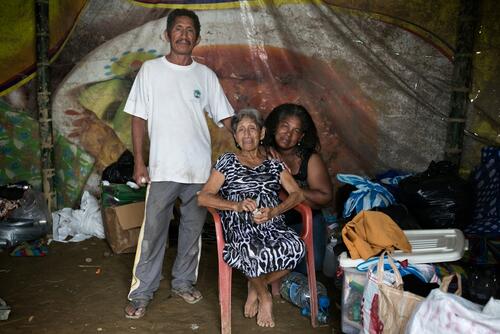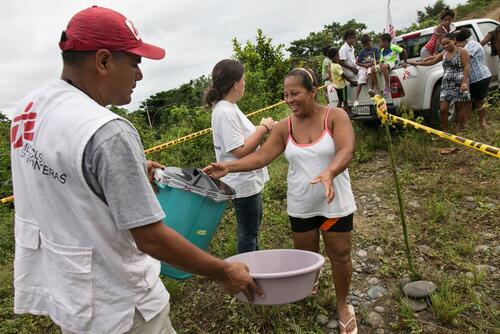Pedernales, in the province of Manabi, was one of the districts most badly damaged by the earthquake that struck Ecuador on 16 April. In less than 40 seconds, the area was almost completely destroyed. Houses, hotels, buildings, shops and canteens were demolished by the quake and many people died under the rubble. The affected community lost everything: their homes, their businesses and many even lost their lives. That day, in just one building near the city’s coast, 70 people died while celebrating a wedding.
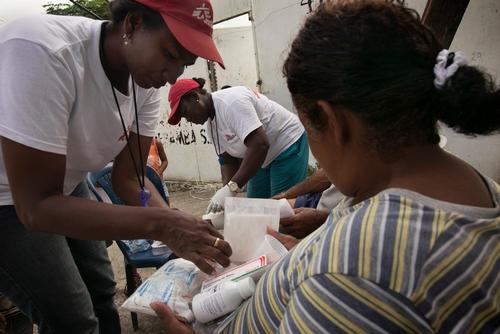
“We lost everything. We thought the end of the world had come that day,” said 65-year-old Manuel from the Tamarindo neighbourhood. “Some of the neighbours went to the countryside to escape the tremors while others took refuge in Pedernales stadium. Whoever runs away, survives.”
MSF in Pedernales
Medecins Sans Frontieres (MSF) has six psychosocial care points in Pedernales. Some are located in shelters; others, in one of the town’s neighbourhoods. Néstor Rubiano, coordinator of the MSF Colombia team in Ecuador, said that, in general, there are areas where more than 40 people are in shelters while in other areas help has yet to arrive. “We are carrying out psychosocial interventions to try to restore people’s normal daily activities as quickly as possible,” he said.
In Pedernales, around 80 per cent of the properties in the community were damaged by the earthquake. Although official aid and help from private institutions and civil society has been arriving over the last week, “as it often happens in these kinds of natural disasters that generate a large number of needs, the lack of coordination between the different people and organisations involved in this emergency is often still a problem,” he said.
“In terms of psychosocial care, we are trying to collaborate with local psychologists. But generally, psychologists find themselves having to deliver humanitarian aid, such as food and water, rather than carrying out their psychosocial activities. In the few cases where psychosocial care is being provided, it is not being carried out in an organised manner and is lacking in follow-up plans. This creates a vacuum, which is why MSF is providing psychosocial assistance,” said Rubiano. In addition, in some areas of Pedernales, MSF is donating water tanks and tents.
“Help, we are sheltered here”
Although many families decided to leave and seek refuge in shelters when the earthquake hit, as time goes by some people have decided to return to the city. “We are from Pedernales and that is where we have to stay. We will only go if the authorities ask us to leave the area, because if we have to be evacuated to another place we don’t have anywhere to go,” says Cusme, who is 40 years old and lives in the Tamarindo neighbourhood with his four-year-old daughter. “Our families would house us for a few weeks or months, but what remains of my house is mine and, here, in my own home, nobody tells me when I have to get up or I get annoyed.”
The people who are still living in Pedernales, or have decided to return to the city, wander through the streets wearing face masks to protect themselves from the dust of the buildings being demolished due to the risk of collapse. But the face masks are also because, in certain areas, you can still smell the stench of corpses.
The Ecuadorian National Secretariat for Risk Management reported today that, as a result of the earthquake, more than 29,000 people across the country are living in shelters, of which more than 24,100 are from the province of Manabi. “There was an exponential increase in the number of people seeking refuge in the shelters at first. But the rain a few days ago has worsened the living conditions in the shelters, prompting many people to return to their homes. Those people are now being left without aid because everything is being concentrated on the shelters,” said Nestor Rubiano. In addition, those who could not return to their homes have set themselves up in small makeshift shelters, made only of plastic and bamboo sticks. They try to ask for help, writing signs that say “Help. We are sheltered here.”
“Now we have to learn to live with the aftershocks. Sometimes, because we’re still on edge, it still feels as though the floor is moving, even when it isn’t. We must learn to live with what happened to us,” said Cusme.
Four MSF teams traveled to Ecuador after the earthquake, and are working in the most affected areas of Manabi and Esmeraldas. So far, they have carried out individual or family counseling for 70 people, 17 group counseling sessions with 137 participants, 81 psycho-education activities with 914 people, and 108 medical consultations. A disaster kit and a full kit for wounded were also donated.



